On September 1, 2025, Nikko Asset Management Co., Ltd. will change its name to Amova Asset Management Co., Ltd.
The Fund seeks to achieve the net asset value per unit to track the performance of the Nikkei Semiconductor Stock Index by investing in component stocks of the index.
Key information
| Name: | Listed Index Fund Nikkei Semiconductor Stock | |
| Code: | 213A |
Net Asset Value and Performance
| Fund Name | Listed Index Fund Nikkei Semiconductor Stock Open-end/Domestic/Equities/ETF/Index type |
| Listed Exchange | Tokyo Stock Exchange |
| Issue Code | 213A |
| Targeted Investments | The Fund aims to achieve investment result that track the movement of the Nikkei Semiconductor Stock Index. |
| Date Listed | 12 July 2024 (launched on 11 July 2024) |
| Exchange Trading Unit | 10 units |
| Trust period | Unlimited |
| Computation Period | From 9 January to 8 July of each year, and 9 July to 8 January of the following year |
| Closing Date | 8th of January, July every year |
| Dividends | As a general rule, the full amount of dividends and other income arising from the trust assets is distributed after deduction of expenses. *There is no guarantee on the payment or the amount of dividend. |
Fund Expenses
■Expenses to be borne directly by investors
| Subscription Fee | Independently set by Distributors *Please contact your Distributor for further information. *Subscription Fee is compensation for explanation and information providing about the Fund or investment environment, and is also including expense of clerical processing of the subscription. |
| Exchange Fee | Independently set by Distributors *Please contact your Distributor for further information. *Exchange(buyback) Fee is compensation for clerical processing of the exchange. |
| Amount to be Retained in Trust Assets | None. |
■Costs paid indirectly by investors from the trust assets
| TER (Total Expense Ratio) |
0.25% (TER includes Trust Fee, management fee and other costs below) Please refer to the prospectus for details. |
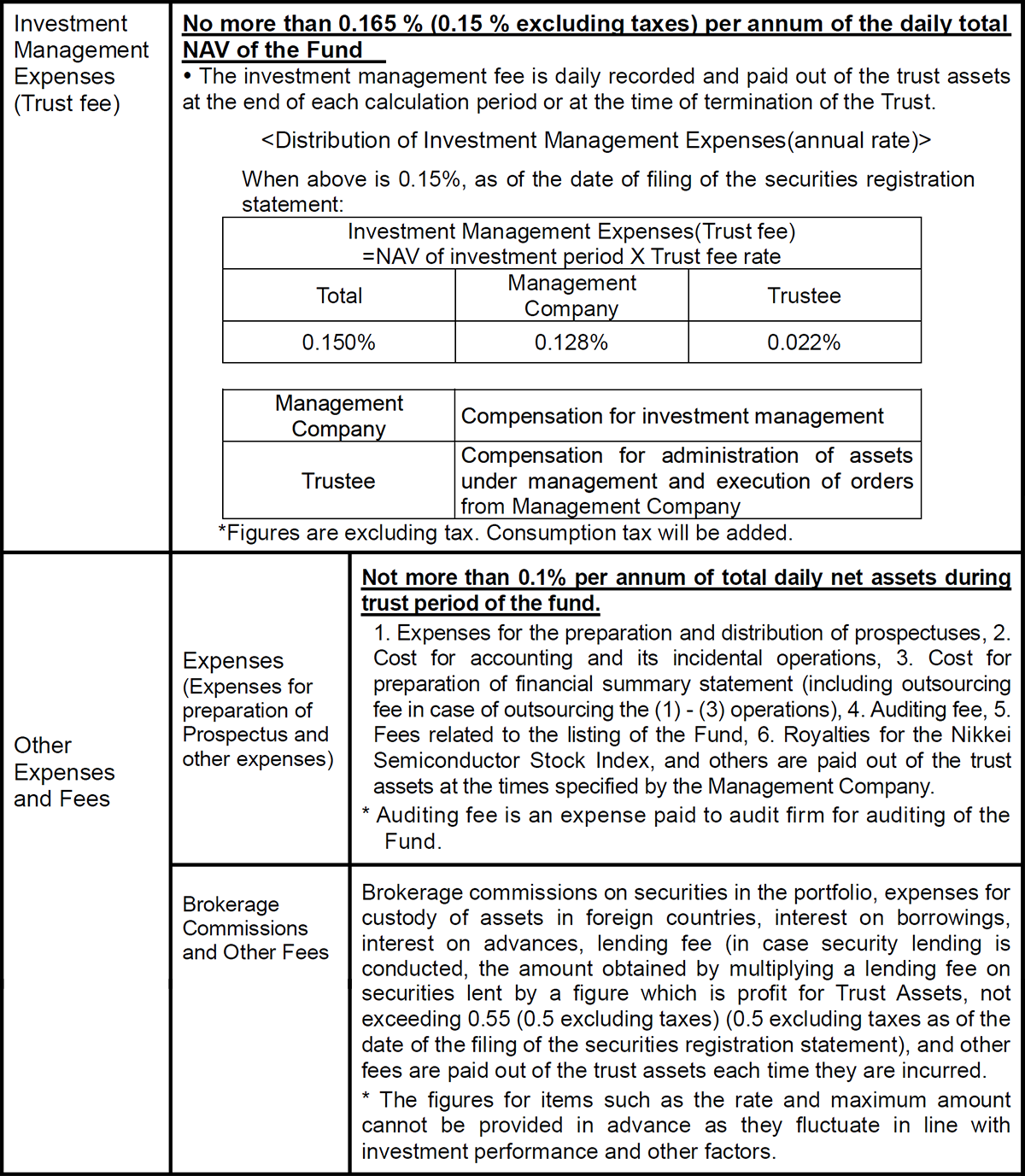
The total amount of expenses of the Fund to be borne by investors varies according to holding length and investment status, and thus cannot be shown.
Investment Restrictions
|
Trustee Companies
|
The Nikkei Semiconductor Stock Index is composed of the top 30 stocks by the market capitalization selected from among semiconductor-related stocks which are listed on Tokyo Stock Exchange. The Index is calculated with a starting value 1,000 point, the base date November 30, 2011.
The component stocks are reviewed every November, in principle.
Further Information
Japan Exchange Group publishes summaries and lists of the ETFs, as well as other valuable information on their website.
S&P Global
- Listed ETF iNav
Please click this link to see the iNAV.
Nikkei Inc.
*Link to external sites.
Copyrights of the "Nikkei Semiconductor Stock Index"
- The Nikkei Semiconductor Stock Index is a copyrighted material calculated in a methodology independently developed and created by Nikkei Inc. and Nikkei Inc. is the sole exclusive owner of the copyright and other intellectual property rights in the Nikkei Semiconductor Stock Index itself and the methodology to calculate the Nikkei Semiconductor Stock Index;
- The intellectual property and any other rights in the marks to indicate Nikkei and the Nikkei Semiconductor Stock Index shall be vested in Nikkei Inc.;
- The ETF is managed exclusively at the risk of the Licensee and Nikkei Inc. shall assume no obligation or responsibility for its management and transactions of the ETF. Nikkei Inc. has - besides granting the license to the Licensee to use certain trademarks and to use the Nikkei Semiconductor Stock Index for the ETF – no connection with the ETF.
- Nikkei Inc. shall not have the obligation to continuously announce the Nikkei Semiconductor Stock Index and shall not be liable for any error, delay, interruption, suspension or cessation of announcement thereof; and
- Nikkei Inc. shall have the right to change the description of the stocks included in the Nikkei Semiconductor Stock Index, the calculation methodology of the Nikkei Semiconductor Stock Index or any other details of the Nikkei Semiconductor Stock Index and shall have the right to suspend or cease the publication of the Nikkei Semiconductor Stock Index without owing any liability to the Licensee or any other third party.
- Nikkei Semiconductor Stock Index is the property of Nikkei Inc., which has contracted with S&P Opco, LLC (a subsidiary of S&P Dow Jones Indices LLC) to calculate and maintain. The Nikkei Semiconductor Stock Index is not sponsored by S&P Dow Jones Indices LLC or its affiliates or its third party licensors, including Standard & Poor's Financial Services LLC and Dow Jones Trademark Holdings LLC (collectively, “S&P Dow Jones Indices”). S&P Dow Jones Indices will not be liable for any errors or omissions in calculating the Nikkei Semiconductor Stock Index. “Calculated by S&P Dow Jones Indices” and the related stylized mark(s) are service marks of S&P Dow Jones Indices and have been licensed for use by Nikkei Inc. S&P® is a registered trademark of Standard & Poor's Financial Services LLC, and Dow Jones® is a registered trademark of Dow Jones Trademark Holdings LLC.
- The ETF based on the Nikkei Semiconductor Stock Index is not sponsored, endorsed, sold or promoted by S&P Dow Jones Indices. S&P Dow Jones Indices does not make any representation or warranty, express or implied, to the owners of the ETF or any member of the public regarding the advisability of investing in securities generally or in the ETF particularly or the ability of the Nikkei Semiconductor Stock Index to track general market performance. S&P Dow Jones Indices’ only relationship to Nikkei Inc. with respect to the Nikkei Semiconductor Stock Index is the licensing of the certain trademarks, service marks and trade names of S&P Dow Jones Indices, and the provision of the calculation services related to the Nikkei Semiconductor Stock Index. S&P Dow Jones Indices is not responsible for and has not participated in the determination of the prices and amount of the ETF or the timing of the issuance or sale of the ETF or in the determination or calculation of the equation by which the ETF may converted into cash or other redemption mechanics. S&P Dow Jones Indices has no obligation or liability in connection with the administration, marketing or trading of the ETF. S&P Dow Jones Indices LLC is not an investment advisor. Inclusion of a security within the Nikkei Semiconductor Stock Index is not a recommendation by S&P Dow Jones Indices to buy, sell, or hold such security, nor is it investment advice.
- S&P DOW JONES INDICES DOES NOT GUARANTEE THE ADEQUACY, ACCURACY, TIMELINESS AND/OR THE COMPLETENESS OF THE NIKKEI SEMICONDUCTOR STOCK INDEX OR ANY DATA RELATED THERETO OR ANY COMMUNICATION WITH RESPECT THERETO, INCLUDING, ORAL, WRITTEN, OR ELECTRONIC COMMUNICATIONS. S&P DOW JONES INDICES SHALL NOT BE SUBJECT TO ANY DAMAGES OR LIABILITY FOR ANY ERRORS, OMISSIONS, OR DELAYS THEREIN. S&P DOW JONES INDICES MAKES NO EXPRESS OR IMPLIED WARRANTIES, AND EXPRESSLY DISCLAIMS ALL WARRANTIES, OF MERCHANTABILITY OR FITNESS FOR A PARTICULAR PURPOSE OR USE OR AS TO RESULTS TO BE OBTAINED BY Nikkei Inc., OWNERS OF THE ETF, OR ANY OTHER PERSON OR ENTITY FROM THE USE OF THE NIKKEI SEMICONDUCTOR STOCK INDEX OR WITH RESPECT TO ANY DATA RELATED THERETO. WITHOUT LIMITING ANY OF THE FOREGOING, IN NO EVENT WHATSOEVER SHALL S&P DOW JONES INDICES BE LIABLE FOR ANY INDIRECT, SPECIAL, INCIDENTAL, PUNITIVE, OR CONSEQUENTIAL DAMAGES, INCLUDING BUT NOT LIMITED TO, LOSS OF PROFITS, TRADING LOSSES, LOST TIME, OR GOODWILL, EVEN IF THEY HAVE BEEN ADVISED OF THE POSSIBILITY OF SUCH DAMAGES, WHETHER IN CONTRACT, TORT, STRICT LIABILITY, OR OTHERWISE.
The term "unit shares" refers to one unit of the basket of stock shares that the investor who applies for an additional subscription will contribute, or one unit of the basket of stock shares that the investor who applies for an exchange will receive in exchange for the beneficiary rights.
In addition to trading in the Tokyo Stock Exchange, investors can apply directly to Authorised Participants for an additional subscription/exchange of this Fund. The application unit in such application is called "unit shares." Please note that the direct application for additional subscription/exchange cannot be processed on certain dates as specified below:
Authorized Participants
- SMBC Nikko Securities Inc.
- ABN AMRO Clearing Tokyo Co., Ltd.
- Barclays Securities Japan Limited
- Daiwa Securities Co. Ltd.
- Goldman Sachs Japan Co.,Ltd.
- Nomura Securities Co., Ltd.
Daily Creation and redemption are based on ETF's NAV calculated in early evening. Confirm non-tradable days by referring to trading calendar on our official homepage. Basket for creation is continually-updated on our official homepage.
Basically sell/buy at last price of T day's market.
The flow chart below is showing the creation/redemption process for Nikko AM ETFs. Please note that transactions cannot be processed for days on which applications are not accepted.
Creation Flow for In-kind Creation/Redemption Type ETFs(Using obligation assumption service by JSCC)
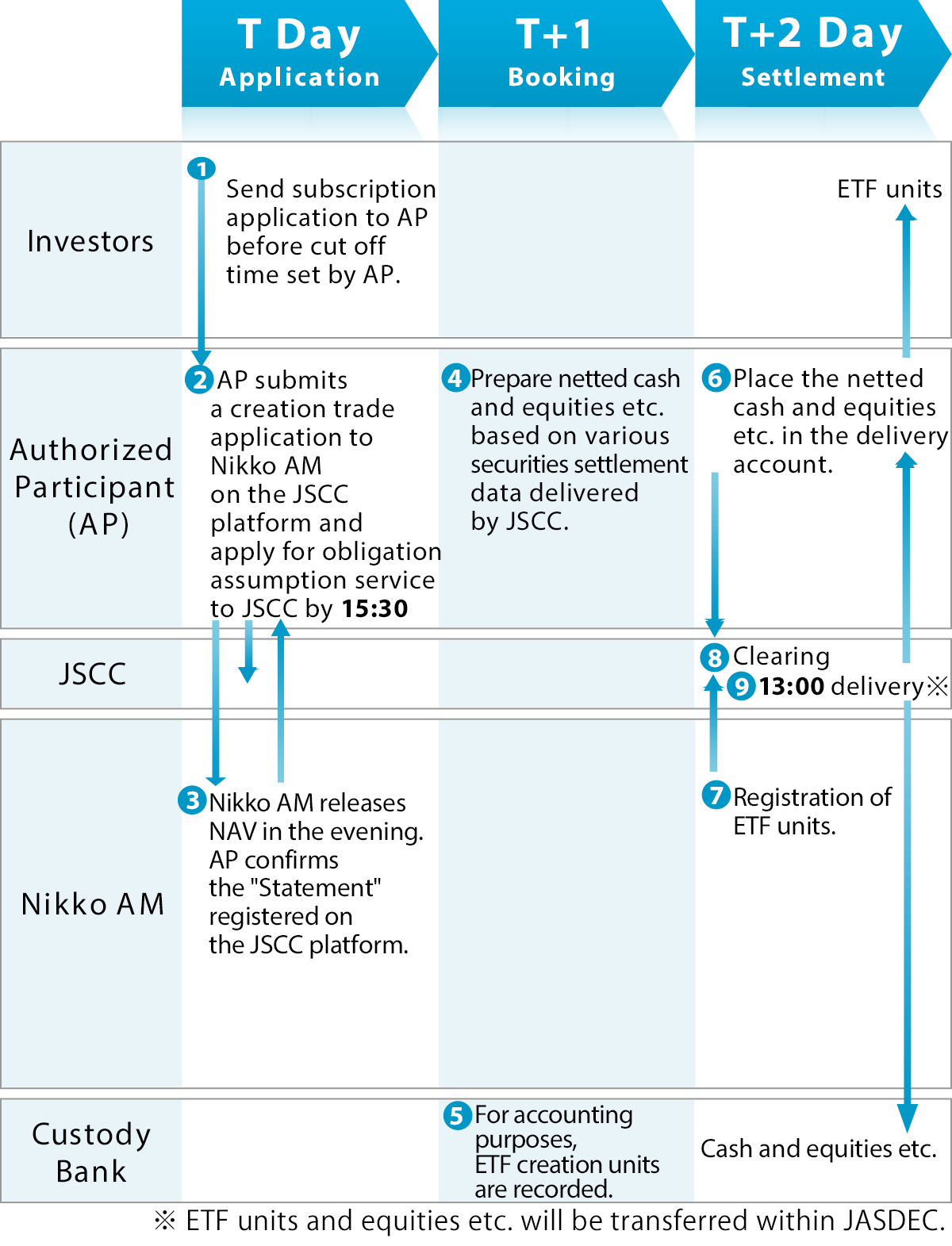
Creation Flow for In-kind Creation/Redemption Type ETFs(Not using obligation assumption service by JSCC)
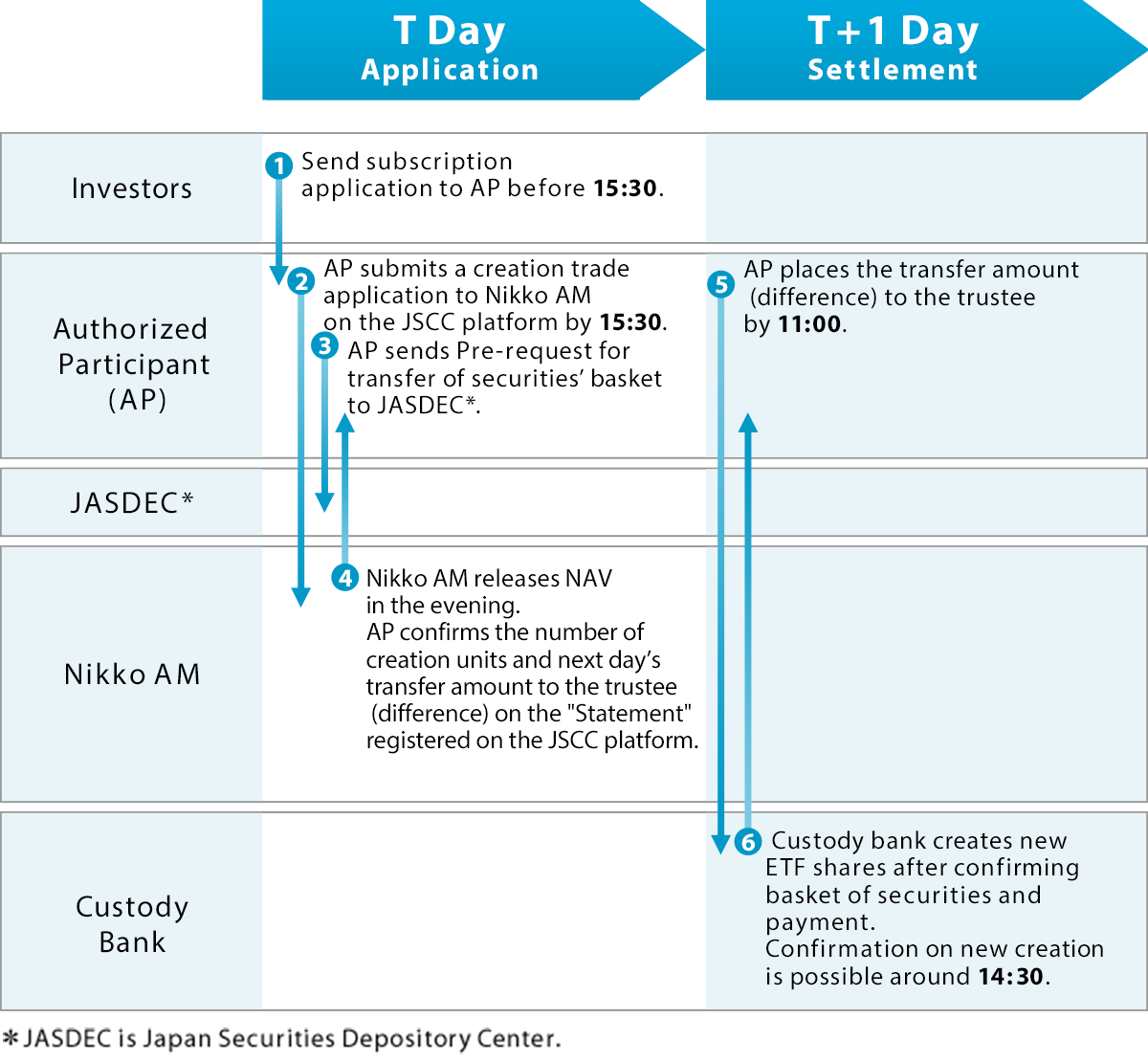
Essential Considerations
- Please secure the basket for creation ETF when making application.
- We recommend you to take measures like borrowing stocks in order to secure the basket for settlement for ETF creation.
Redemption flow for in-kind Creation/Redemption Type ETF(Using obligation assumption service by JSCC)
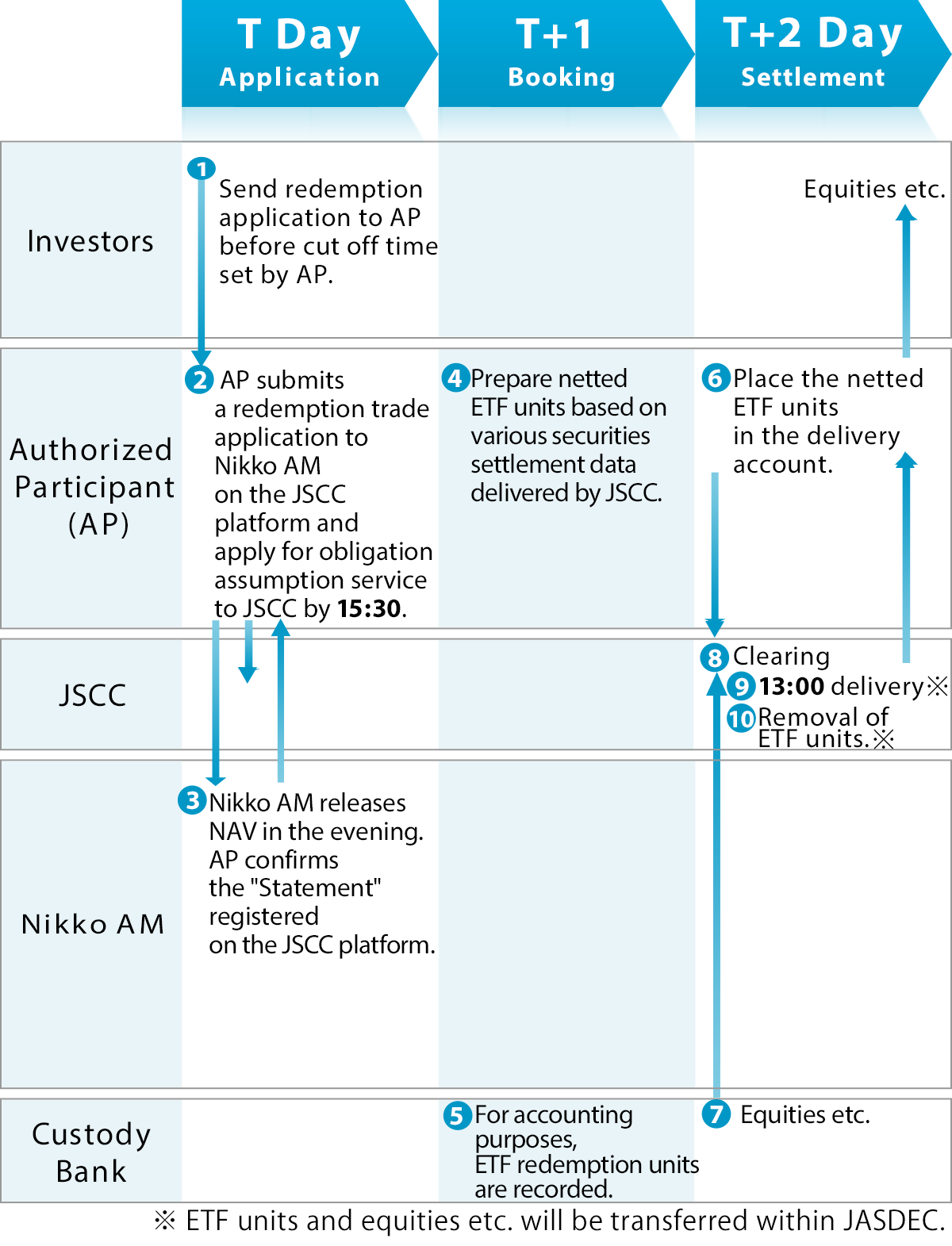
Redemption flow for in-kind Creation/Redemption Type ETF(Not using obligation assumption service by JSCC)
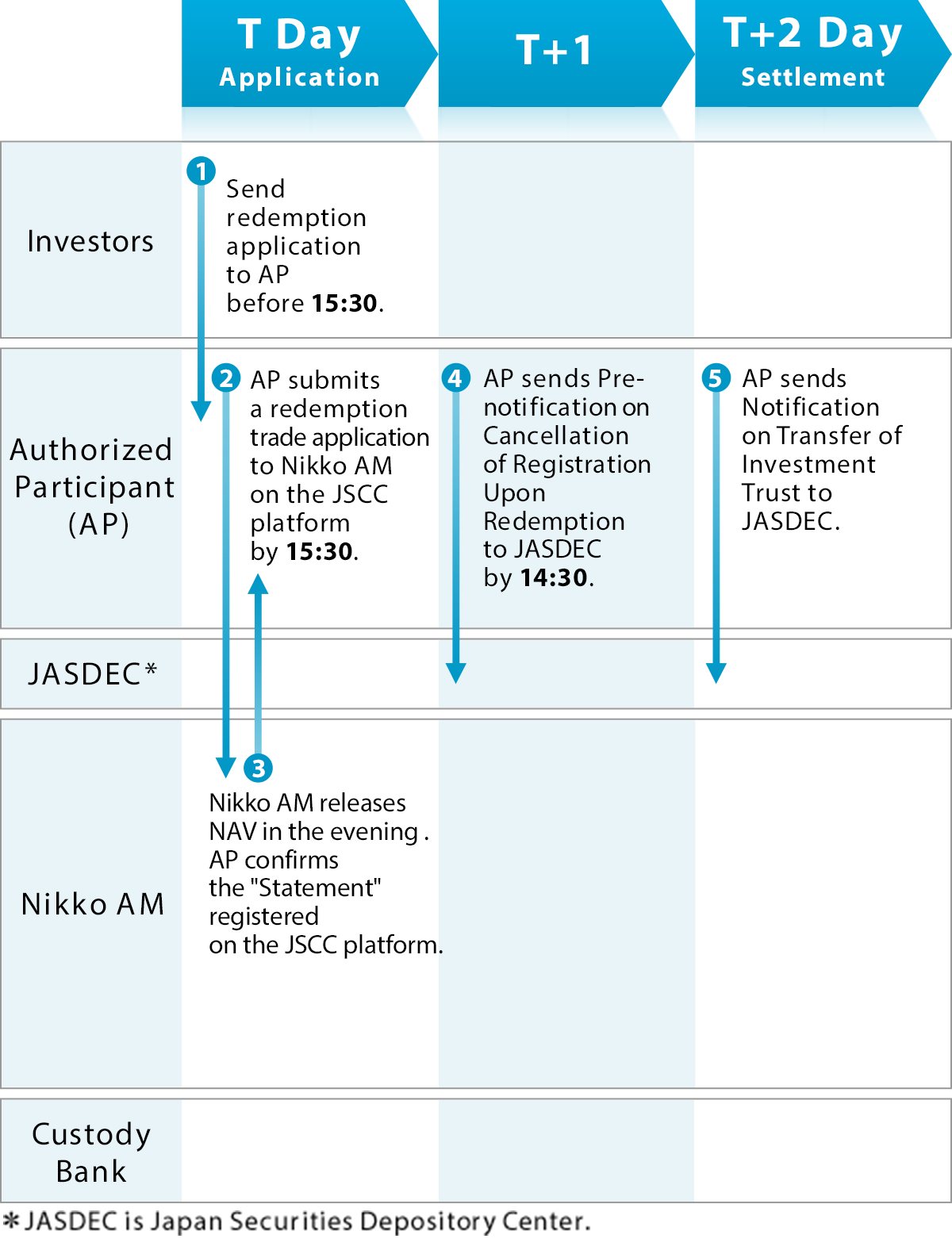
Investment Risks
The major risks associated with investment in the Fund are outlined below. Investors should ensure they carefully examine and understand fully these risks before deciding to subscribe to units of the Fund.
Factors that contribute to the NAV volatility
Investors are not guaranteed the investment principal that they commit. Investors may incur a loss and the value of their investment principal may fall below par as the result of a decline in the market price or NAV. All profits and losses arising from investments in the Fund belong to the investors (beneficiaries). The Fund is different from saving deposit.
The Fund invests primarily in stocks. The NAV of the Fund may fall and investors may suffer a loss due to a decline in stock prices or deterioration in the financial conditions and business performance of an equity issuer.
Major risks are as follows:
Price Fluctuation Risk
- Stock prices fluctuate as they are affected by information on the company’s growth rate and profitability as well as changes in such information. They also fluctuate as they are affected by economic and political conditions in Japan and abroad. There is a risk that the Fund will suffer material losses if unexpected changes occur in stock price or liquidity.
- Small and mid-cap stocks tend to have greater price volatility than the overall stock market average, which may also have a significant impact on the NAV.
Liquidity Risk
- The Fund may incur unexpected losses when the size of the market or trading volumes is small. The purchase and sale prices of securities are influenced by trading volume, resulting in the risks that they cannot be traded at prices expected to be realized in light of the prevailing market trend, sold at the estimated prices, or that the trading volume is limited regardless of the level of prices.
- In general, small and mid-cap stocks are considered to have higher liquidity risk due to their smaller market size and trading volume compared to the average of the overall stock market.
Credit Risk
- There is a risk that the Fund will incur material losses in the event of a serious crisis that directly or indirectly affects the business of a corporation in which the Fund invests. The prices of stocks of issuers may substantially decline (possibly to zero) due to fears of default or corporate bankruptcy, which can contribute to decline in the Fund NAV.
Security-lending Risk
- Lending of securities involves counterparty risks, which are the risks of contractual default or cancellation following bankruptcy, etc., by the counterparty. As a result, the Fund may suffer unexpected losses. Following the default or cancellation of a lending agreement, when liquidation procedures are implemented by using the collateral that is set aside in the lending agreement, the procurement cost of buying back the securities can surpass the collateral value, due to price fluctuations in the market. In such cases, the Fund is required to pay the difference, which may cause the Fund to incur losses.
<Major factors for discrepancy between the Nikkei Semiconductor Stock Index and the NAV>
The Fund seeks to match the NAV volatility with that of the Nikkei Semiconductor Stock Index, but it cannot guarantee that movements will be consistent with the Index for the following reasons:
- The potential investment in selected issues other than the Nikkei Semiconductor Stock Index, the potential market impact from the trading, etc., of individual issues when portfolio adjustments are made due to changes in selected issues on the Nikkei Semiconductor Stock Index or capital transfers, or costs borne by the Fund such as trust fees, brokerage commission, and audit costs, etc.
- The timing and amount of payment for the distribution of the Fund will not be completely the same as the distribution from the underlying stocks.
- When derivative transactions such as futures are made, there may be disparity between the price movements of all or some of such transactions and that of the Nikkei Semiconductor Stock Index.
- Dividends may be paid by stocks in the portfolio and fees may be earned for securities lent.
<Discrepancy between the market prices at which stocks are traded on exchanges and the NAV>
The Fund is listed on the Tokyo Stock Exchange and the units are traded on that exchange. The market price of the units is affected primarily by the size of demand for the Fund, its performance, and how attractive it is to investors in comparison with their other investments. It is not possible to predict whether the units will sell in the market above or below the NAV.
* Factors that contribute to fluctuations in the NAV are not limited to those listed above.
Additional Considerations
- This document is meant as promotional material whose purpose is for Nikko Asset Management to provide information about its "Listed Index Fund Nikkei Semiconductor Stock" and for investors to gain further understanding about the fund.
- The provisions stipulated in Article 37-6 of the Financial Instruments and Exchange Act (the “cooling-off period”) are not applicable to Fund transactions.
- This Fund differs from deposits or insurance policies in that it is not protected by the Deposit Insurance Corporation of Japan or the Policyholders Protection Corporation of Japan. Nor are investment trusts protected by investor protection funds when purchased at banks or other registered financial institutions.
- When the Fund faces big redemption causing short term cash requirement or sudden change in the main trading market condition, there can be temporal decline in the liquidity of holding assets, resulting in the risks that Fund unable to trade securities at the expected market prices or appraised prices, or encounters limitation in trading volume. This may result in the negative influence on NAV, suspension of redemption applications, or delay in making payment of redemption.
- When applying to invest in the Fund, please make the decision to invest carefully after taking the time to read the delivered pre-agreement document and other relevant materials in detail.


